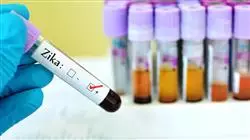University certificate
The world's largest faculty of medicine”
Introduction to the Program
Would you like to update your clinical management of the most frequent viral diseases? This Postgraduate diploma will provide you with everything you need to achieve it 100% online”

Arboviruses, zoonoses or viral hemorrhagic fevers comprise a wide range of diseases: rabies, tuberculosis, tick-borne encephalitis, dengue fever, filaria, etc. This group of viral pathologies causes millions of deaths every year around the world and its resistance to the environment has favored the mutation of the microorganisms that cause them, making their eradication difficult and forcing specialists to constantly establish new diagnostic and therapeutic guidelines to help patients recover their health and avoid potential sequelae.
In this context, medical professionals, in addition to playing a major role in health care, are forced to constantly update their knowledge in this regard, which sometimes becomes complicated due to lack of time and the speed with which new treatments and clinical guidelines emerge. For this reason, and as a manifesto of TECH's commitment to this field, it has developed a complete program that includes the latest news on hemorrhagic viral fevers, arbovirosis and zoonosis in a convenient 100% online format. Over six months, our students will be able to delve into the latest advances in epidemiology, focusing on the most effective protocols and approaches used in clinical settings. They will intensively work through updated knowledge of rare diseases and present challenges in infectious diseases, so they can incorporate into their practice the most accurate and innovative diagnostic techniques in current clinical contexts.
For this purpose, they will benefit from 450 hours of diverse content designed by experts in microbiology, medicine and infectious diseases, who are also part of the teaching team that will guide them throughout this academic experience. This material includes detailed videos, research articles and complementary readings so students can contextualize the information in the syllabus and personalize their study of each section. Our students will thus be able to hone their skills while balancing the program with their work by designing their own study timetable according to their clinical schedule.
You will be able to update your knowledge of the epidemiology of infectious diseases throughout 450 hours of the best theoretical, practical and additional content”
This Postgraduate diploma in Viral Hemorrhagic Fevers, Arbovirosis and Zoonosis contains the most complete and up-to-date scientific program on the market. The most important features include:
- Case studies presented by experts in infectious diseases in clinical practice
- The graphic, schematic, and practical contents with which they are created, provide scientific and practical information on the disciplines that are essential for professional practice
- Practical exercises where the self-assessment process can be carried out to improve learning
- Its special emphasis on innovative methodologies
- Theoretical lessons, questions to the expert, debate forums on controversial topics, and individual reflection assignments
- Content that is accessible from any fixed or portable device with an Internet connection
If you are interested in learning about the latest clinical evidence for the diagnosis and treatments of different zoonotic diseases, this program contains the latest information for you to do just that”
The program’s teaching staff includes professionals from sector who contribute their work experience to this program, as well as renowned specialists from leading societies and prestigious universities.
The multimedia content, developed with the latest educational technology, will provide the professional with situated and contextual learning, i.e., a simulated environment that will provide immersive education programmed to learn in real situations.
This program is designed around Problem-Based Learning, whereby students must try to solve the different professional practice situations that arise during the academic year. To that end, they will be assisted by an innovative, interactive video system created by renowned and experienced experts.
This program adapts to you: You will have unlimited access to the Virtual Campus through any device with an Internet connection. No fixed schedules or face-to-face classes"

The best program in the current academic market to delve into the latest advances in molecular biology and its importance for the advancement of medicine"
Why study at TECH?
TECH is the world’s largest online university. With an impressive catalog of more than 14,000 university programs available in 11 languages, it is positioned as a leader in employability, with a 99% job placement rate. In addition, it relies on an enormous faculty of more than 6,000 professors of the highest international renown.

Study at the world's largest online university and guarantee your professional success. The future starts at TECH”
The world’s best online university according to FORBES
The prestigious Forbes magazine, specialized in business and finance, has highlighted TECH as “the world's best online university” This is what they have recently stated in an article in their digital edition in which they echo the success story of this institution, “thanks to the academic offer it provides, the selection of its teaching staff, and an innovative learning method aimed at educating the professionals of the future”
A revolutionary study method, a cutting-edge faculty and a practical focus: the key to TECH's success.
The most complete study plans on the university scene
TECH offers the most complete study plans on the university scene, with syllabuses that cover fundamental concepts and, at the same time, the main scientific advances in their specific scientific areas. In addition, these programs are continuously being updated to guarantee students the academic vanguard and the most in-demand professional skills. In this way, the university's qualifications provide its graduates with a significant advantage to propel their careers to success.
TECH offers the most comprehensive and intensive study plans on the current university scene.
A world-class teaching staff
TECH's teaching staff is made up of more than 6,000 professors with the highest international recognition. Professors, researchers and top executives of multinational companies, including Isaiah Covington, performance coach of the Boston Celtics; Magda Romanska, principal investigator at Harvard MetaLAB; Ignacio Wistumba, chairman of the department of translational molecular pathology at MD Anderson Cancer Center; and D.W. Pine, creative director of TIME magazine, among others.
Internationally renowned experts, specialized in different branches of Health, Technology, Communication and Business, form part of the TECH faculty.
A unique learning method
TECH is the first university to use Relearning in all its programs. It is the best online learning methodology, accredited with international teaching quality certifications, provided by prestigious educational agencies. In addition, this disruptive educational model is complemented with the “Case Method”, thereby setting up a unique online teaching strategy. Innovative teaching resources are also implemented, including detailed videos, infographics and interactive summaries.
TECH combines Relearning and the Case Method in all its university programs to guarantee excellent theoretical and practical learning, studying whenever and wherever you want.
The world's largest online university
TECH is the world’s largest online university. We are the largest educational institution, with the best and widest online educational catalog, one hundred percent online and covering the vast majority of areas of knowledge. We offer a large selection of our own degrees and accredited online undergraduate and postgraduate degrees. In total, more than 14,000 university degrees, in eleven different languages, make us the largest educational largest in the world.
TECH has the world's most extensive catalog of academic and official programs, available in more than 11 languages.
Google Premier Partner
The American technology giant has awarded TECH the Google Google Premier Partner badge. This award, which is only available to 3% of the world's companies, highlights the efficient, flexible and tailored experience that this university provides to students. The recognition as a Google Premier Partner not only accredits the maximum rigor, performance and investment in TECH's digital infrastructures, but also places this university as one of the world's leading technology companies.
Google has positioned TECH in the top 3% of the world's most important technology companies by awarding it its Google Premier Partner badge.
The official online university of the NBA
TECH is the official online university of the NBA. Thanks to our agreement with the biggest league in basketball, we offer our students exclusive university programs, as well as a wide variety of educational resources focused on the business of the league and other areas of the sports industry. Each program is made up of a uniquely designed syllabus and features exceptional guest hosts: professionals with a distinguished sports background who will offer their expertise on the most relevant topics.
TECH has been selected by the NBA, the world's top basketball league, as its official online university.
The top-rated university by its students
Students have positioned TECH as the world's top-rated university on the main review websites, with a highest rating of 4.9 out of 5, obtained from more than 1,000 reviews. These results consolidate TECH as the benchmark university institution at an international level, reflecting the excellence and positive impact of its educational model.” reflecting the excellence and positive impact of its educational model.”
TECH is the world’s top-rated university by its students.
Leaders in employability
TECH has managed to become the leading university in employability. 99% of its students obtain jobs in the academic field they have studied, within one year of completing any of the university's programs. A similar number achieve immediate career enhancement. All this thanks to a study methodology that bases its effectiveness on the acquisition of practical skills, which are absolutely necessary for professional development.
99% of TECH graduates find a job within a year of completing their studies.
Postgraduate Diploma in Hemorrhagic Viral Diseases, Arbovirosis and Zoonosis
Infectious pathologies have become a worldwide concern, its difficult identification and elimination represents a challenge for health systems and research centers that investigate how to deal with this problem, so today we are looking for the best prepared professionals in this field of medicine. From TECH Global University we identified the needs of this important branch of knowledge, therefore, we designed the Postgraduate Diploma in Hemorrhagic Viral Diseases, Arbovirosis and Zoonosis. In this complete 425-hour program you will acquire the necessary skills to work in depth in prevention, diagnosis and treatment of infectious diseases through a multidisciplinary approach that facilitates the control of these pathologies.
Take an online Postgraduate Certificate in Infectious Diseases
In this TECH program we have the necessary thematic axes to qualify you in: avian flu, rabies, epidemiology, properties of microorganisms and other topics that will qualify you as a doctor with the highest quality standards in this branch of knowledge. In addition, at TECH we will provide you with the necessary skills to enter the research field, so that you can make considerable advances in the mitigation of this type of pathologies. On the other hand, you will learn through an innovative methodology called Relearning, which will allow you to efficiently internalize the concepts with the objective of applying them competently in work practice.







